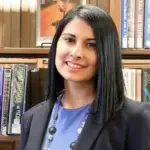Master of Library & Information Science (MLIS)
The Master of Library & Information Science (MLIS) program at UCLA provides students with a blend of conceptual and theoretical knowledge and practical experience. In the classroom, students acquire a solid foundation in contemporary library, archival, and information science theory, information seeking and retrieval skills, and information technology expertise.
Outside the classroom, the internship program, involving over 250 organizations across Southern California, extends classroom learning by giving students the opportunity to apply their theoretical insights and practical skills in a professional environment.
Our students are mentored for leadership in whatever field of information work they choose to enter. The program has near 100% work placement within six months of graduation. We do this by providing:
- Face-to-face classroom instruction
- A wide choice of specializations and course offerings
- Internship opportunities
- Individual advisors
- Mentoring programs
- Teamwork experience
- Support for student participation in professional organizations
- The opportunity for students either to compile a portfolio in which they assess and present their career-related activities to date, or to write a thesis presenting the results of original research
The UCLA MLIS program is accredited by the American Library Association (ALA) and is one of the most innovative and comprehensive in the country. Our graduates are highly successful and accomplished information professionals who work in a wide variety of institutions after graduation.
Academic Information
The goals of the UCLA MLIS program include:
- To provide students with a coherent program of study that includes broad preparation in foundational knowledge and skills as well as opportunities to cultivate more specialized areas of interest
- To ensure that students have the cultural competency to engage with and advocate for a diverse range of information environments
- To provide students with the technological and intellectual fluency, ethics, skills and knowledge necessary to thrive, innovate and critically intervene in a diverse range of information environments
- To ensure that all students are enabled to take advantage of a broad array of professionally appropriate internship and field experience opportunities
Archival Studies
Courses in this area explore the full spectrum of archival materials (e.g., paper and electronic records, manuscripts, still and moving images, oral history), the theory that underlies recordkeeping, archival policy development, and memory-making, and the historical roles that recordkeeping, archives, and documentary evidence play in a pluralized and increasingly global society. In addition to covering traditional archives and manuscripts theory and practice, this area of specialization addresses the dramatic expansion of the archival field. Advanced seminars and an outstanding array of internship opportunities prepare students to play leadership roles in archives and manuscripts administration, records management, archival education and training, preservation, digital curatorship, recordkeeping policy development, archival systems design, electronic records management, and digital asset management.
Informatics
The field of informatics is premised on the observation that successful integration of information services into society requires a sophisticated understanding of the ways in which information technologies function as vehicles of power and social action. Students who complete this specialization will be uniquely well-equipped to design modern information services, including digital libraries, data repositories, metadata services, and search engines, in a wide variety of institutional contexts, such as community archives, cultural heritage, e-commerce, electronic publishing, and government. Courses explore theories of information-seeking behavior and information use, user-centered approaches to information system design, human-computer interaction, database design and management, and information policy, including intellectual property, informational privacy, and internet governance.
Library Studies
Students selecting this specialization learn about the functional activities associated with the profession of librarianship, such as collection development, public services, cataloging and classification, service to children and young adults, and outreach to underserved populations. Students may also take classes that prepare them to work in a particular type of library, such as public, academic, or corporate. The specialization stresses the core values of the profession as articulated by the American Library Association: access, confidentiality and privacy, democracy, education and lifelong learning, intellectual freedom, preservation, the public good, professionalism, service, and social responsibility. When students graduate, not only will they have the basic professional skills expected of all beginning librarians, they will also have an understanding of the dynamic nature of the field that will enable them to develop as leaders for the profession.
Media Archival Studies
The Media Archival Studies (MAS) specialization focuses on the full range of historical, contemporary, and emergent media-making contexts and formats and the unique challenges they pose, from 19th-century optical devices through classical Hollywood cinema to the emerging sound, image, and video formats of today. Students in this specialization explore how theories and concepts of archival practice are most effectively applied to the particular needs and characteristics of all kinds of recorded media. This broad-based approach to media making, description, preservation and management encourages students to develop a highly adaptable professional skill set that allows them to keep pace in an environment of constant technological change. Classes and seminars are complemented with opportunities for practicum and internship experiences at world-class archives, major motion picture studios, and technical service providers in Los Angeles and beyond.
Rare Books/Print and Visual Culture
This specialization provides a foundation in the history of literacy technologies, from early writing and manuscript culture through print and digital format, and addresses contemporary challenges for thinking about digital scholarship and special collections. It engages in active discussion of the ways legacy collections meet diversity initiatives in expanding horizons for scholarship and research. Drawing on archival science, bibliography, digital humanities, and librarianship, courses explore the professional and historical aspects of activities in rare books, print history, and visual resources, including ongoing scholarship about the nature of literacy, cataloging and metadata, intellectual property, the politics of publishing and distribution, and the creation and use of digital and digitized special collections.
The UCLA Department of Information Studies operates a dynamic and progressive internship program.
This program provides students enrolled in the MLIS or Ph.D. degree programs with a wide range of opportunities to apply their knowledge and skills in a structured professional environment under the supervision, guidance and mentoring of current practitioners in the information profession.
The internship program has been in place since the 1970s and has grown to include nearly 250 sites. Our Los Angeles location allows us to offer an exciting and diverse range of local internship sites. Our program is highly regarded among local organizations and companies.
Among those working with UCLA to offer internships to our students are:
- Cedars-Sinai Medical Center
- The Getty
- Los Angeles County Museum of Art
- Los Angeles Public Library Huntington Library
- Statewide California Electronic Library Consortium (SCELC)
More than 20 internships are also available within UCLA, such as:
- Fowler Museum
- UCLA College Library
- UCLA Digital Collections Services
- UCLA Ethnomusicology Archive
- UCLA Film and Television Archive
- UCLA Special Collections
The MLIS core curriculum provides a coherent program of study for all MLIS students. Each core course is taught face-to-face by a member of regular faculty. Each course includes the needs and perspectives of every MLIS specialization, and each addresses issues relating to ethics and values.
After completing the MLIS core, students will be able to articulate key concepts, advocate fundamental values, formulate policies, and demonstrate the advanced intellectual, technological, and managerial skills needed to practice, lead, and innovate in the information professions. They will also be able to apply the highest ethical standards in their professional information practice. They will appreciate the needs of diverse communities and be able to design and provide systems and services that are appropriate in a multicultural society. Every core course is offered every year. Full-time MLIS students are normally expected to complete all of the core courses during their first year.
What Graduates Do
MLIS alumni go on to do amazing work in their fields. This information is designed to provide an introduction to the diverse research interests of MLIS scholars.
Contact Us
Chair, Department of Information Studies
Rob Montoya
montoya@seis.ucla.edu
Administrative Manager
Ryan Lebre
lebre@gseis.ucla.edu
(310) 983-3206
Student Affairs Officer
Amy Gershon
gershon@gseis.ucla.edu
(310) 825-8326







